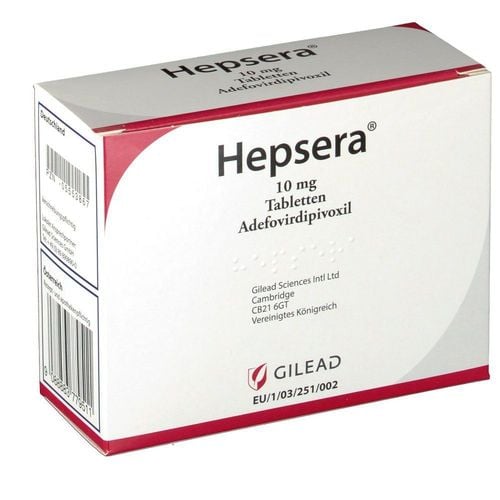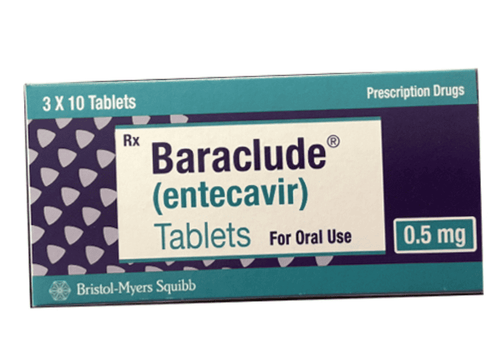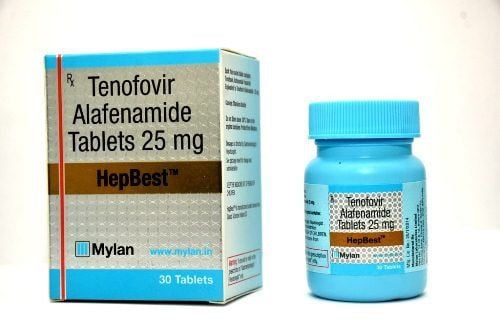This is an automatically translated article.
Pegasys is used to treat chronic hepatitis B or hepatitis C. To ensure the effectiveness of use, users should follow the instructions of their doctors, and at the same time refer to more information about the uses of Pegasys in the article below.
1. What are the uses of Pegasys?
1.1. What is Pegasys? Pegasys is an anti-cancer drug that acts on the immune system. Helps treat diseases caused by viral infections such as: Chronic hepatitis B, chronic hepatitis C, or HIV-HCV co-infection. The drug Pegasys with registration number: QLSP-864-15 is a product of F.Hoffmann-La Roche., Ltd - manufactured in Switzerland, and registered by F.Hoffmann-La Roche., Ltd
Pegasys is formulated preparation of injectable drugs; Package : Box and 1 pre-packed syringe; The main ingredient is Peginterferon alfa-2a and has a concentration of 180 mcg/0.5 ml. 1.2. What does Pegasys do? Pegasys is indicated for use in the following cases:
Treatment of chronic hepatitis B, in both HBeAg positive and HBeAg negative cases in patients without cirrhosis or in cirrhotic patients with liver disease remaining compensated, and there is evidence of viral replication and hepatitis. Pegasys is used alone or in combination with ribavirin to treat chronic hepatitis C in patients without cirrhosis and in patients with compensated cirrhosis. The Pegasys 180 and Ribavirin combination regimen is indicated for patients who are new to first-line therapy or who have failed previous treatment with interferon alpha (in the peginterferon-modified or classical form), as a single agent. treatment or in combination with ribavirin. The use of Pegasys is contraindicated in the following cases:
The patient is known to be sensitive to Peginterferon alfa, products extracted from E.coli, polyethyleneglycol or to any of its ingredients. Patients with autoimmune hepatitis. Patients with decompensated cirrhosis. HIV-HCV co-infected patients have cirrhosis and Child-Pugh score more than 6. Infants and children less than 3 years old. The combination therapy of Pegasys and Ribavirin should not be used in pregnant women.
2. Usage of hepatitis drug Pegasys
2.1. How to use hepatitis drug Pegasys Pegasys is prepared in the form of an injectable solution, so patients use the drug by injection or intravenous infusion. Patients should not arbitrarily perform the operation to inject Pegasys, but need to be consulted by medical staff. 2.2. Dosage of hepatitis drug Pegasys Injection SC (abdomen, thighs): Each injection is used 180 mcg, injected once a week. Chronic hepatitis B (both HBeAg positive or negative): Take for 48 weeks. Inject 180mcg per injection. Chronic hepatitis C (monotherapy or in combination with Ribavirin): Use for 24 to 48 weeks, depending on virus genotype and response to treatment. Treated, but failed, chronic hepatitis C (in combination with ribavirin): 72 weeks in genotype 1 or 4 patients, and 48 weeks in genotype 2 or 3. HIV - HCV infection (monotherapy, or combination with 800 mg of Ribavirin): Treatment for 48 weeks. Elderly: No dose adjustment is required. Patients with end-stage renal failure: Start with 135mcg injection, once a week. How to handle when missed dose, overdose of Pegasys:
In case of missed dose of Pegasys, it is recommended to supplement as soon as possible. However, if it is almost time for the next dose, skip the missed dose of Pegasys and use a new dose. When using Pegasys drug overdose, the patient should stop the drug immediately and go to the nearest medical facility for timely treatment.
3. Notes when using Pegasys
Be careful when taking Pegasys with:
Patients with hepatitis C who have failed in previous treatment; People with autoimmune disorders or psoriasis ; Untreatable thyroid abnormalities; People with a history of depression or heart disease; There are no official reports on the effects of Pegasys on pregnant and lactating women. Therefore, before taking Pegasys, patients should consult a doctor for advice and use only when the benefits to the mother are believed to outweigh the risks to the fetus and baby.
4. Side effects of Pegasys
At therapeutic doses, Pegasys was well tolerated. However, the process of using Pegasys, the patient may still experience side effects such as:
Common:
Chills, cough, feeling sad, empty, feverish, or irritable, less appetite eating, loss of interest, back pain, painful or difficult urination, pale skin, sore throat, fatigue, trouble sleeping, trouble concentrating, sores or white spots inside the mouth, unusual bleeding or weakness. Uncommon:
Bone pain, chest pain, irritability, confusion, constipation, depressed mood, dizziness, dry skin and hair, easy fainting, heart palpitations, body feeling cold, hair loss, head pain, hoarseness, muscle cramps, rapid breathing, slowed heart rate, sneezing, stomach pain, chest tightness, shortness of breath with exertion, or weight gain. Unknown:
Accumulation of pus in arms, blistering, peeling, diarrhea, dry mouth, itching, joint pain, muscle pain, red eyes, irritability, red skin, convulsions, sunken eyes, swelling, redness, pain in the area of infection in the arms or legs, thirst, and wrinkled skin. If you experience these symptoms, the patient should stop using Pegasys and notify the doctor for appropriate treatment.
5. How to store Pegasys
Store Pegasys in the refrigerator, at a temperature of 2-80C. Do not freeze or shake. Store in original box to protect from light. The shelf life of Pegasys is 36 months from the date of manufacture. Do not use Pegasys after the expiry date indicated on the package. Keep Pegasys medicine out of the sight and reach of children. Above is all information about Pegasys drug, patients need to carefully read the instructions for use, consult a doctor / pharmacist before using. Note, Pegasys is a prescription drug, so patients should absolutely not buy drugs to treat at home because they may experience unwanted side effects.













